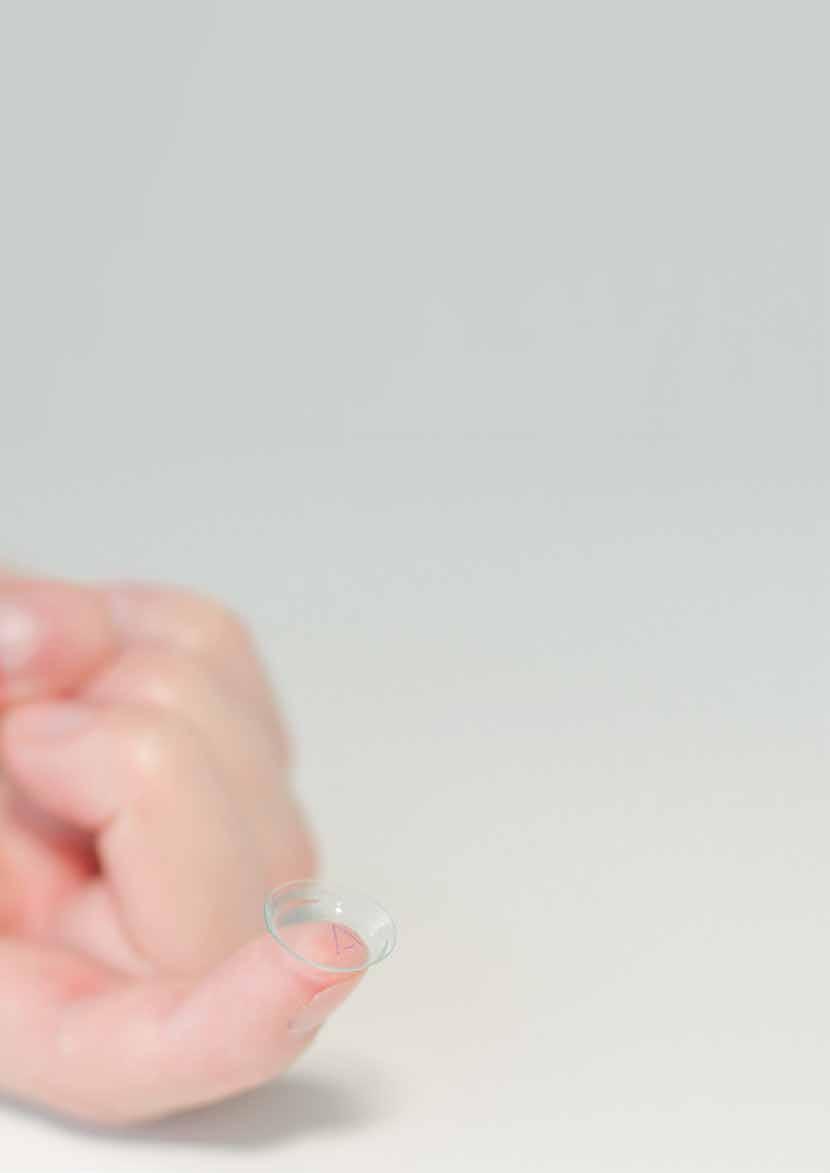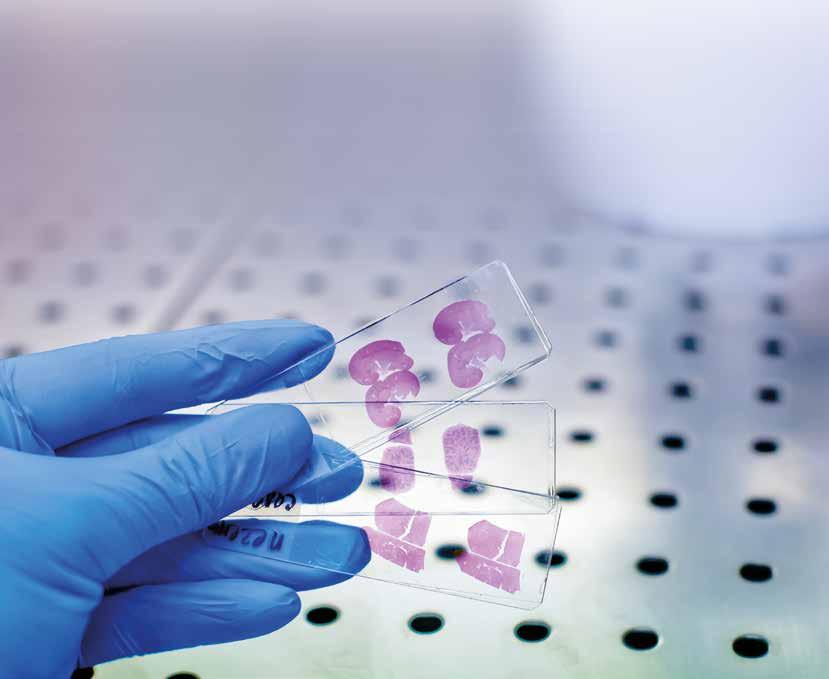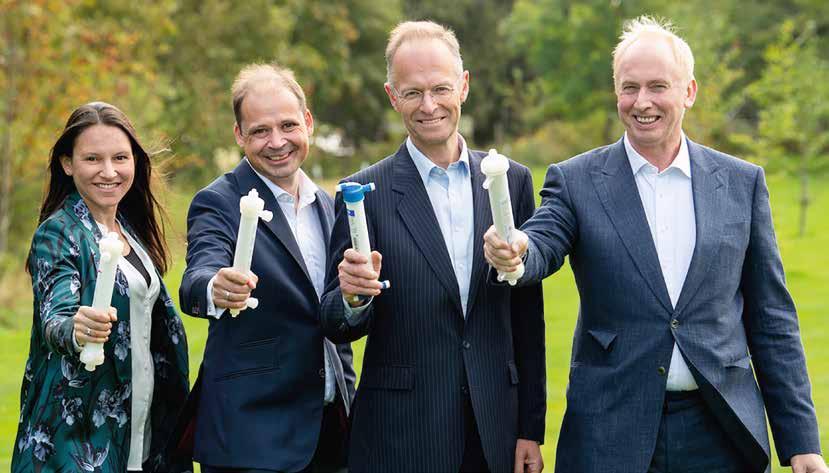
10 minute read
Regenerative therapy for sightdestroying conditions
The company’s platform regenerative therapy, Omnigen, is based on many years of extensive human amniotic membrane (amnion) translation research carried out at the University of Nottingham by NuVision’s founder, and CSO, Dr Andrew Hopkinson.
Omnigen harnesses the natural regenerative properties of amnion, which surrounds babies in the womb and is normally discarded at birth. The healing properties of amnion, which is part of the placenta and is the innermost layer of the sac that surrounds NuVision Biotherapies is a regenerative company, spun out from the University of Nottingham in 2015, that was established to commercialise clinically available and highly versatile biotherapies for treating ‘front of the eye’ disease and trauma, as well as wider wound care purposes. and nurtures the baby during pregnancy, have long been recognised. It has natural wound healing, anti-inflammatory and anti-scarring properties, and because it is not recognised by the immune system, it can be transplanted to patients with minimum risk of rejection. It allows effective treatment for a range of sight-destroying ocular surface disease, providing comfort for the patient. Conventionally, surgeons suture it to the eye to promote healing and repair defects. Unfortunately, patients therefore still have to wait to be referred for costly surgery to receive this therapy. NuVision’s latest innovation, OmniLenz, overcomes this problem. OmniLenz is a unique and bespoke bandage contact lens that uniquely allows the application Omnigen, in a simple five minute ‘in the office’ procedure, eliminating the need for complex surgery and sutures. With OmniLenz, Omnigen can be routinely applied directly to the eyes of burns or trauma victims, patients enduring persistent corneal ulcers, and now patients suffering inflammatory diseases such as dry eye disease, Sjogren’s and graft versus host disease, providing conform and relief to alleviate pain by up to 70 per cent and to promote wound healing.
Until recently, processing amnion for clinical use involved storing the amnion frozen at -80 degrees. However, freezing damages the tissue and reduces its wound healing properties. The tissue needs to remain frozen until use and delivery can take 24 hours, making it unsuitable for emergency and routine in the office setting.
Omnigen is made from waste tissue given by women undergoing an elective Caesarean section. They are screened for health conditions beforehand and their blood is tested for communicable diseases. The amnion is processed in specialised laboratories, using a process called Tereo, into a dry sterile sheet and cut into discs to be stored. As a dry and stable product,
Omnigen can be easily shipped to be used or readily stored at the point of care. Applied directly to the human eye dry, the natural moisture in the eye or wound rehydrates the patch, where it reduces pain, protects against infections and promotes healing. More patients may benefit from treatment earlier, and therefore potentially more effectively, from first presentation. With OmniLenz application of Omnigen, NuVision aims to dramatically shorten the treatment pathway to improve patient care whilst delivering significant costs and resource saving to the already pressured NHS. Routine in clinic application of Omnigen may revolutionise the treatment approach for ocular surface disease.
Omnigen is the currently the first UK dry human amnion derived product to have delivered encouraging proof of concept, and is now being used in over 60 UK hospitals, 14 different countries and delivering ~6000 sight saving treatments for patients. NuVision is currently working with hospitals to generate the necessary data to obtain widespread clinical acceptance, with several major clinical trials starting in coming months.

Innovative tool to increase collaboration between tissue sample providers and researchers
The difficulty of sourcing samples from the NHS is a common cry, with demands remaining unfulfilled locally and a reported 75 per cent of samples being sourced from overseas. In contrast, recent reports also highlight that only a small percentage of samples donated in the UK are actually used in research.
For tissue banks and researchers, this is an expensive and time-consuming business. Yet, the answer seems simple – put the researchers in touch with Biobanks and tissue providers.
This is exactly what the UKCRC online Tissue Directory aims to do. The directory is a national web-based portal used by Biobanks to advertise their tissue sample holdings data to researchers. However, for Biobanks and biorepositories there is still the challenge of getting their data to the directory.
Every Biobank has its own way of working and categorising and classifying tissue samples, but the Tissue Directory naturally expects data to be provided in a standard format and using definitions. Due to the overheads involved in retraining and redefining processes, Biobanks are reluctant to change how they work in order to fit with the data standards and formatting rules required by the directory. They also don’t want to spend hours fiddling with data to put it into the right format every time it needs to be uploaded.
Birmingham-based Interactive Software Limited’s Achiever Medical LIMS provides the answer. Achiever Medical is a complete sample tracking and lab information management system that makes it easier for Biobanks to leverage the UKCRC’s online Tissue Directory. Its dynamic transformation tool enables Biobanks to map their terminology and classifications to those needed by the Directory in the software. Importantly, it does this for both the data values and column names. What’s more, Biobanks can choose exactly which sample holdings data to send to the directory – and how often. Biobanks only need to set everything up once and then the software does the rest, automatically sending dynamically transformed and updated data. As a result, Biobanks don’t need to spend days reworking processes and retraining teams. Researchers can source tissue samples from one centralised location and generously donated tissues get used for their intended purpose – to further research. Interactive Software’s UKCRC Integration Module recently won the Innovation award at the Medilink West Midlands Medical and Healthcare Business Awards 2019.

Improving health through digital connected care An award-winning London company is using digital health technology to change the way in which patients and healthcare providers manage chronic conditions.
SmartMed Global was born from a desire to enhance the levels of healthcare provided to millions of people across the world. The company has built a digital health platform designed to put the patient at the centre of care. It focuses on four key elements to provide care that not only improves the health of the patient but also increases the efficiency of providers. The platform brings together communication, self-care, adherence and remote monitoring in a unique way.
For example, through regular vital signs and wellbeing monitoring, the company’s mobile healthcare (mHealth) system, SmartMed HomeCare, empowers patients to effectively self-manage their own longterm, chronic conditions.
Patients can take their own readings from the comfort of their own home, which is particularly beneficial for people who find it difficult to attend appointments at hospitals or clinics, and the information is then remotely assessed by qualified healthcare professionals quickly. The platform’s algorithm enables data to be triaged quickly, thus saving time and resources. The healthcare provider can then intervene in a timely manner, ensuring the patient gets the best possible individualised care.
Using the latest mobile telecoms and device technologies, SmartMed HomeCare enables patients to live healthier lives by enabling them to manage their own health monitoring from the comfort of their own homes. In addition to enhancing patient wellbeing, the platform has modules to support adherence and self-care tools to ensure that patients are fully supported in a holistic way. Furthermore, it can reduce costs for the healthcare provider (by reducing the need for unnecessary appointments) and improve the efficiency and quality of the care provided. In the long run, it can aid healthcare providers such as the NHS in taking on the challenge that is presented by the rise in chronic illness.
Within the SmartMed platform, the company has built flexible solutions to help lessen the burden on community nurses and other healthcare workers as well. SmartMed HealthWorker goes a step further by equipping community nurses or healthcare workers with a set of connected medical peripheral devices, as well as a unique smartphone or tablet app and patient records database. It allows community care providers to visit more patients in their home or community setting and gather a broader range key vital signs data and symptoms. The patient data is then uploaded to the central clinic or hospital, where specialists can analyse the results and make recommendations to the healthcare worker on treatment or referrals. The advantage is that it cuts down on healthcare workers needing to keep coming back to clinics and also uploading the data, as this is done by the SmartMed app.
The SmartMed HealthKiosk provides a community healthcare solution similar to HealthWorker, except the patient comes to the Kiosk which is mostly static and can be located in a community building such as a school, library, clinic or factory. Kiosk is specifically designed for the developing world and it enables a broader range of quality healthcare assessments to be delivered into the heart of remote communities or workplaces. This is an ideal solution for online consultation in remote areas.
SmartMed currently operates in a number of countries, including in Malaysia where they are working with the largest private hospital group KPJ. The company recently won the Outstanding Achievement award for the London region at SEHTA’s 2019 MedTech Business Awards.
Making medicines more secure in the NHS
CLIQ utilises mechanical, high security disc cylinders combined with highly encrypted electronic locking and identification. It provides a system of remote key management, providing access audit trails and the ability to remove lost or stolen keys.
Within healthcare, installing CLIQ on drug cabinets has made medicines more secure. As the key provides power to the lock, it also requires no batteries or wires, making it an ideal retrofit solution for the NHS. The system gives every nurse their own key, programmed to provide entry to every cabinet they are authorised to have access to and validated for the duration of their shift. Security experts Abloy UK have worked alongside a number of West Midlands hospitals to implement its CLIQ locking technology, including Queen Elizabeth Hospital, Birmingham City Hospital and Sandwell General Hospital. Subsequently, this frees up nurses’ time looking for keys allowing more time to care and quickly administer medicines. In one instance, figures from an audit of patients who felt their painkillers were given promptly jumped from 79 per cent to 92 per cent following the installation of CLIQ. Abloy UK recently won the award for Delivering Innovation into Health and Care at the 2019 Medilink West Midlands Medical and Healthcare Business Awards. This award recognises innovations adopted by the NHS which demonstrate an impact on efficiency, patient outcomes and system costs.
www.abloy.co.uk
MedCity is an independent, not-for-pro t cluster organisation that works to promote and grow life sciences investment, entrepreneurship and industry across London and the Greater South East of England. Through our work, we facilitate greater connectivity across the three pillars of industry, academia and the National Health Service. Supported by the Mayor of London, the London Academic Health Science Centres, research institutes and life sciences organisations across the region, MedCity acts as a vital Front Door to the sector. From drug discovery to devices, diagnostics and digital health, we work with industry, researchers and investors looking for partners, investment, infrastructure and expertise. Find out more at MedCityHQ.com or follow us on Twitter @MedCityHQ
“The healthcare sector is facing enormous strain, so we’re constantly striving to deliver value and innovations that will relieve some of that pressure. We’re incredibly proud of the CLIQ system and the tangible efficiencies it brings to many NHS trusts across the country.”
Aaron Yule Managing Director Abloy UK
Your front door to the life sciences sector of England's greater south east
MedCity is an independent, not-for-profit cluster organisation that works to promote and grow life sciences investment, entrepreneurship and industry across London and the Greater South East of England. Through our work, we facilitate greater connectivity across the three pillars of industry, academia and the National Health Service.

Supported by the Mayor of London, the London Academic Health Science Centres, research institutes and life sciences organisations across the region, MedCity acts as a vital Front Door to the sector. From drug discovery to devices, diagnostics and digital health, we work with industry, researchers and investors looking for partners, investment, infrastructure and expertise.

When your communications really matter...









